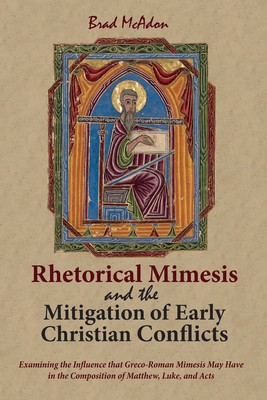
- We will send in 10–14 business days.
- Author: Brad McAdon
- Publisher: Pickwick Publications
- Year: 2018
- Pages: 338
- ISBN-10: 153263773X
- ISBN-13: 9781532637735
- Format: 15.2 x 22.9 x 2.1 cm, hardcover
- Language: English
- SAVE -10% with code: EXTRA
Rhetorical Mimesis and the Mitigation of Early Christian Conflicts (e-book) (used book) | bookbook.eu
Reviews
Description
This interdisciplinary study focuses upon two conflicts within early Christianity and demonstrates how these conflicts were radically transformed by the Greco-Roman rhetorical and compositional practice of mimesis--the primary means by which Greco-Roman students were taught to read, write, speak, and analyze literary works. The first conflict is the controversy surrounding Jesus's relationship with his family (his mother and brothers) and the closely related issue concerning his (alleged) illegitimate birth that is (arguably) evident in the gospel of Mark, and then the author of Matthew's and the author of Luke's recasting of this controversy via mimetic rhetorical and compositional strategies. I demonstrate that the author of our canonical Luke knew, vehemently disagreed with, used, and mimetically transformed Matthew's infancy narrative (Matt 1-2) in crafting his own. The second controversy is the author of Acts' imitative transformation of the Petrine/Pauline controversy--that, in Acts 7:58--15:30, the author knew, disagreed with, used, and mimetically transformed Gal 1-2 via compositional strategies similar to how he transformed Matthew's birth narrative, and recast the intense controversy between the two pillars of earliest Christianity, Peter and Paul, into a unity and harmony that, historically, never existed. ""This is a landmark study of early Christian rhetorical criticism--rigorous both philologically and theoretically--that leaves little doubt as to the presence of rhetorical imitation in the gospels and Acts, and even strikes a strong blow against the Q hypothesis as it does so. Any detractors have their work cut out for them."" --Mike Duncan, Associate Professor, Department of English, University of Houston-Downtown Brad McAdon is an associate professor of English at the University of Memphis where he teaches histories of rhetoric (especially Greco-Roman), rhetorical theory, the Bible as literature, and the history of the Bible as a book, as an artifact.
EXTRA 10 % discount with code: EXTRA
The promotion ends in 18d.16:16:26
The discount code is valid when purchasing from 10 €. Discounts do not stack.
- Author: Brad McAdon
- Publisher: Pickwick Publications
- Year: 2018
- Pages: 338
- ISBN-10: 153263773X
- ISBN-13: 9781532637735
- Format: 15.2 x 22.9 x 2.1 cm, hardcover
- Language: English English
This interdisciplinary study focuses upon two conflicts within early Christianity and demonstrates how these conflicts were radically transformed by the Greco-Roman rhetorical and compositional practice of mimesis--the primary means by which Greco-Roman students were taught to read, write, speak, and analyze literary works. The first conflict is the controversy surrounding Jesus's relationship with his family (his mother and brothers) and the closely related issue concerning his (alleged) illegitimate birth that is (arguably) evident in the gospel of Mark, and then the author of Matthew's and the author of Luke's recasting of this controversy via mimetic rhetorical and compositional strategies. I demonstrate that the author of our canonical Luke knew, vehemently disagreed with, used, and mimetically transformed Matthew's infancy narrative (Matt 1-2) in crafting his own. The second controversy is the author of Acts' imitative transformation of the Petrine/Pauline controversy--that, in Acts 7:58--15:30, the author knew, disagreed with, used, and mimetically transformed Gal 1-2 via compositional strategies similar to how he transformed Matthew's birth narrative, and recast the intense controversy between the two pillars of earliest Christianity, Peter and Paul, into a unity and harmony that, historically, never existed. ""This is a landmark study of early Christian rhetorical criticism--rigorous both philologically and theoretically--that leaves little doubt as to the presence of rhetorical imitation in the gospels and Acts, and even strikes a strong blow against the Q hypothesis as it does so. Any detractors have their work cut out for them."" --Mike Duncan, Associate Professor, Department of English, University of Houston-Downtown Brad McAdon is an associate professor of English at the University of Memphis where he teaches histories of rhetoric (especially Greco-Roman), rhetorical theory, the Bible as literature, and the history of the Bible as a book, as an artifact.


Reviews